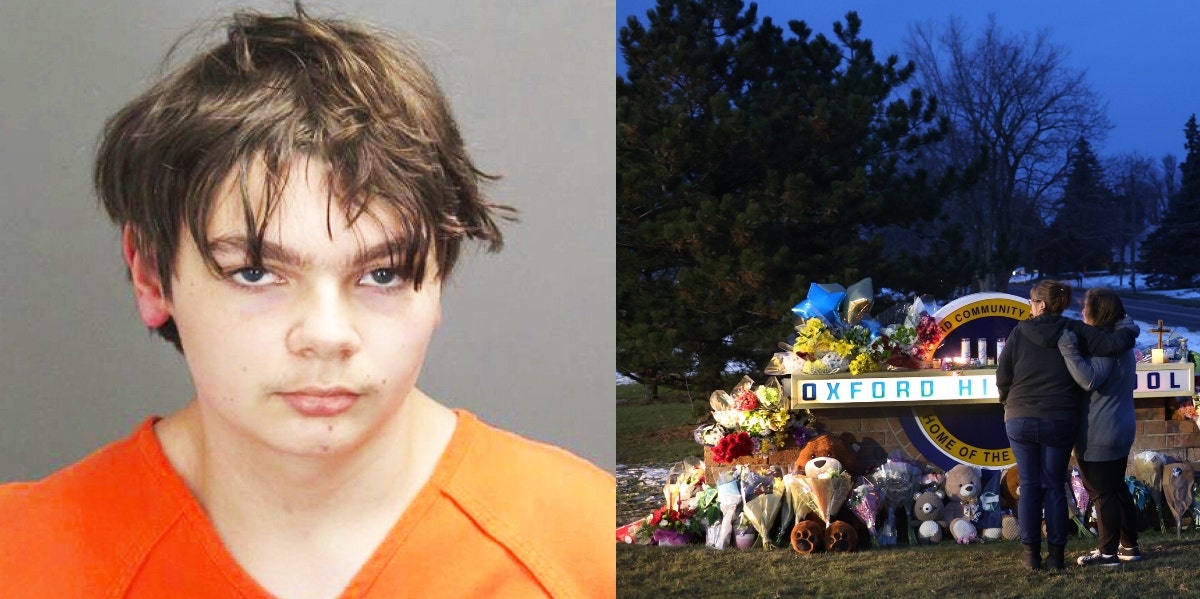Why The Myth That School Shooters Are Usually Victims Of Bullying Is Dangerously Inaccurate
This assumption has to stop.
 Oakland Sherriff's Department / Twitter
Oakland Sherriff's Department / Twitter When the nation heard of the horrific shooting at Oxford High School in Michigan on November 30, details about accused shooter Ethan Crumbley soon followed.
Evidence of a troubled past and an affinity for violence trickled into the many profiles about the alleged killer of four students.
This, as has been the case with many past school shootings, was followed by suggestions that Crumbley was a victim of bullying prior to the shooting.
Linking bullying to school shootings is dangerously inaccurate — but all too common.
There is no detailed data that suggests most school shooters are victims of bullying or that bullying pushed a shooter to commit such crimes.
Authorities have said they have found no evidence that suggests Crumbley was bullied. What they do have is a journal filled with descriptions of violent massacres and social media profiles that show an obsession with guns.
It is one of the popular but problematic myths that has existed since the Columbine High School shooting in 1999.
The perpetrators of the shooting, Eric Harris and Dylan Klebold, were described as “loners” and “social outcasts” by the press but evidence has shown that the pair had a wide friend group and packed social calendars.
They played on sports teams and made no mention of bullying in journals.
“They both had a lot of friends. They both engaged in school activities, out-of-school activities, they worked part-time jobs with some of their buddies at a pizza shop,” says Peter Langman, a psychologist who has studied school shootings.
Sue Klebold even consulted Langman for insight about her son Dylan while she was writing a memoir.
It’s not just the Columbine shooters who complicate the narrative around school shooters being outcasts.
TJ Lane, who killed three fellow students at Chardon High School in Ohio in 2012 was described by a friend as “a very normal, just teenage boy” and though some said he was picked on, his private journals didn’t appear to suggest that this was a motive for the killing.
In 2014, Jaylen Fryberg killed five students when he opened fire at Marysville Pilchuck High School in Washington. He had been named the school’s freshman homecoming prince a week earlier and was largely considered to be well-liked and popular with his peers.
While it’s true to say that, like most high school students, these shooters have probably been picked on at one time or another, it is reductive to link bullying directly to shootings.
“Bullying is very common, very common,” says clinical psychologist Patricia A. Gorman, “Most youth who are bullied do not kill their peers.”
The idea that these school shootings could have been prevented if students had just been nicer to their peers entirely neglects the reality of these tragic attacks and deflects blame.
It leaves out an extensive list of factors from mental health issues and family problems to obsessions with guns and a disrespect for authority.
The FBI has rejected the idea that bullying causes school shootings.
In a threat assessment report on school shootings, the bureau stresses that “no one factor is decisive” for shooters.
They also list a number of “widespread but wrong or unverified impressions of school shooters.”
Among them are the notions that shootings are exclusively a revenge act and the idea that “the school shooter is always a loner.”
The intertwining factors that create a school shooter are much more complex than some classroom teasing but there are some clear common traits between these murderers.
Often it is the dangerous intersection of untreated mental illness and access to deadly weapons that set the stage for a shooting.
A report from the Secret Service and Department of Education that looked at school shooters between 1974 and 2000, found that 78% had a history of suicide attempts or suicidal thoughts. 61% had a history of feeling depressed.
Bullied youths are also at a much higher risk of experiencing depression and suicide. So, if we’re to make any connection between school shootings and bullying perhaps it should be that both are part of a youth mental health crisis that is going untreated.
Identifying “loner” kids who may become school shooters is not helpful if we aren’t going to seek to offer care for these students.
Appropriate mental health care for students could have widespread impacts in preventing violence in schools and also lead to a decrease in drop-out rates, drug and alcohol abuse and suicides.
“We are in a nationwide mental health crisis,” Gorman tells us.
“We need more professional and peer counselors in school — i.e. more funding. We need less guns,” Gorman adds, “We need to change the culture in schools, and on social media. We need to offer more support for families in trouble.”
Alice Kelly is a senior news and entertainment editor for YourTango. Based out of Brooklyn, New York, her work covers all things social justice, pop culture, and human interest. Keep up with her Twitter for more.

